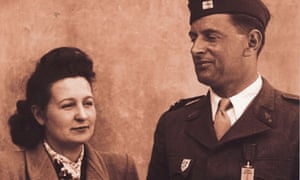One of the great figures of the French resistanceRobert Gildea THE GUARDIAN Mon 11 May 2020

Cécile and Henri Rol-Tanguy. They worked in tandem and he led the irregular French forces in the Paris insurrection of August 1944
Cécile Rol-Tanguy, who has died aged 101, was one of the great figures of the French resistance. She came from a communist family and worked in tandem with her husband, Henri Rol-Tanguy, who led the irregular French forces in the Paris insurrection of August 1944. Long in his shadow, she came into her own as a veteran and voice of the resistance in the years after his death in 2002.
Her father, François Le Bihan, a Breton who had worked in Les Halles market in Paris, joined the navy, trained as a radio electrician and met his wife, Germaine Jaganet, while based at Royan in the south-west of France at the end of the first world war. Returning to Paris, he joined the French Communist party (PCF) as soon as it was founded in 1920.
Cécile, who was born in Royan, was brought up in an environment dedicated to international communism. Her family’s home sheltered political exiles from Italy, Germany, Hungary, Czechoslovakia and Yugoslavia, and as a girl Cécile joined the Jeunes Filles de France, set up by the PCF. In 1936, aged 17, she found a job as a shorthand typist in the engineers union of the Confédération Générale du Travail. There she met Henri Tanguy, a Breton like herself, who had been repeatedly sacked from car factories for fomenting strikes and now worked as a permanent official for the union.
Cécile Rol-Tanguy, who has died aged 101, was one of the great figures of the French resistance. She came from a communist family and worked in tandem with her husband, Henri Rol-Tanguy, who led the irregular French forces in the Paris insurrection of August 1944. Long in his shadow, she came into her own as a veteran and voice of the resistance in the years after his death in 2002.
Her father, François Le Bihan, a Breton who had worked in Les Halles market in Paris, joined the navy, trained as a radio electrician and met his wife, Germaine Jaganet, while based at Royan in the south-west of France at the end of the first world war. Returning to Paris, he joined the French Communist party (PCF) as soon as it was founded in 1920.
Cécile, who was born in Royan, was brought up in an environment dedicated to international communism. Her family’s home sheltered political exiles from Italy, Germany, Hungary, Czechoslovakia and Yugoslavia, and as a girl Cécile joined the Jeunes Filles de France, set up by the PCF. In 1936, aged 17, she found a job as a shorthand typist in the engineers union of the Confédération Générale du Travail. There she met Henri Tanguy, a Breton like herself, who had been repeatedly sacked from car factories for fomenting strikes and now worked as a permanent official for the union.

Cécile Rol-Tanguy at the the ceremony marking the 65th anniversary of the liberation of Paris from Nazi occupation in 2009. Photograph: Horacio Villalobos/EPA
Cécile and Henri were soon plunged into the maelstrom of what they saw as a war between fascism and communism. When the Spanish civil war broke out in 1936, Henri went to fight in the International Brigades while Cécile worked with the Aid for Spain Committee and wrote him letters as his “war godmother”. Henri claimed to be a revolutionary who would never marry, but they wed in 1939. When the second world war broke out Henri was sent to the front at Sarrebourg, then to a factory in the Pyrenees as a skilled worker.
Cécile’s father was arrested as a communist in 1940 and her first child, Françoise, died as a baby in the same year, just as the German army closed in on Paris. Instead of collapsing, she decided to resist. “I had nothing left,” she said in a 2012 interview. “My father had been arrested, I didn’t know where my husband was, and I had lost my little girl. What could hold me back?”
Henri became an underground communist resister, first for the Organisation Spéciale, then the Franc-Tireurs et Partisans (FTP). Cécile typed flyers and acted as his liaison agent, keeping the resistance network together and replacing those who were arrested.
Resistance was extremely dangerous. Those who fell into the hands of the Vichy or German authorities risked deportation or execution. Cécile’s father escaped after his arrest but was recaptured in 1941 and deported the following year to Auschwitz, where he died.
After two comrades were arrested in the autumn of 1942, Henri was sent away to the Poitiers area for six months. Cécile stayed in Paris with her mother, who, when necessary, cared for their two children, Hélène and Jean. Henri returned to Paris in the spring of 1943 and was appointed FTP chief in the Paris region, working with the Polish-Jewish resister Joseph Epstein. Cécile liaised between them and also with Boris Holban, the Romanian-Jewish leader of the Paris FTP-MOI, which mobilised communists of foreign origin. Epstein was arrested and executed on 11 April 1944.
In June 1944 Henri became Paris head of the Forces Françaises de l’Intérieur (FFI), which brought together communist and non-communist irregulars. He adopted the nom de guerre of Rol after a comrade killed in Spain.
On 14 August 1944, Cécile took Henri’s machine gun from one part of Paris to another, avoiding German road blocks, while her mother took flyers in Jean’s pram and Hélène danced along the pavement. At dawn on 19 August the insurrection order signed by Henri was posted across Paris.
The liberation of Paris covered Henri in glory but General Charles de Gaulle was determined to reassert his own power and to prioritise the role of the Free French forces, which he had founded and which had fought outside France until they entered Paris under General Philippe Leclerc on 24 August 1944.
On 27 August, the day after he walked down the Champs-Élysées to rapturous crowds, De Gaulle invited 20 leaders of the internal resistance to the War Ministry. Each was tersely thanked before the general dismissed him with “Good. Next!” Cécile was the only woman present. “Personally, I did not find it very welcoming,” she recalled. “It was a very small reception, without even a glass of wine to finish with.”
The internal resistance was humiliated because it had a large communist contingent and because it detracted from De Gaulle’s personal glory. Henri continued in the army proper and fought his way to Germany, but he was then given a military desk job in Versailles.
Commemorations always celebrated the role of the Free French and of Leclerc in particular. On one occasion Cécile told the mayor of Paris, Jacques Chirac, that not giving her husband a seat in the front row of such commemorations was “an affront to history”.
In recent years Cécile enjoyed greater recognition. She became co-president of the Friends of the Spanish Republican Fighters, set up in 1996, of which her daughter Claire was general secretary. Frequently she gave talks in schools about the resistance, becoming the star turn after the death of Lucie Aubrac in 2007. In May 2014 she spoke at a conference to mark the 70th anniversary of the Liberation at the French Institute in London. She was made a Grand Officier de la Légion d’Honneur in 2014 and was awarded the Grande Croix de l’Ordre National du Mérite in 2017.
She is survived by her four children, Hélène, Jean, Claire and Francis.
• Cécile Rol-Tanguy, French resistance agent, born 10 April 1919; died 8 May 2020
No comments:
Post a Comment